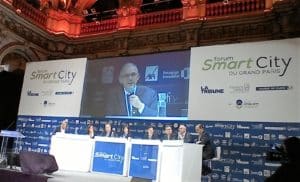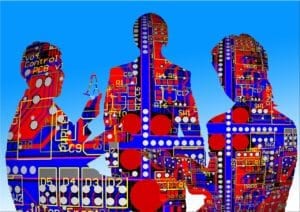Data and artificial intelligence
Data and artificial intelligence
The rising tide of data in C21st cities is raising concerns over the relationship between technology and humans. At Forum Smart City Paris on 29 November, a round table explored if and how artificial intelligence (AI) and data can improve urban life.

“We exaggerate the importance of data. I think we should focus more on new mobility usage,” said Guillaume Devauchelle, Group Innovation and Scientific Development Vice-President, Valeo. “Data is just one resource, amongst others, for serving a purpose. The real issue is knowing what to do with it. There’s little point amassing data with no goals in mind; it’s like having books in a library that no-one reads!”
- To stay the pace in the field of autonomous driving, in June 2017 Valeo launched Valeo.ai, a Paris-based global research centre dedicated to AI and deep learning for automotive applications
“By definition, autonomous vehicles [AV] must be ‘hackable’, but this shouldn’t stop us progressing with new functions,” said Mr Devauchelle. “AVs must be ‘hacked’ when manoeuvring in public car parks since the infrastructure gives the necessary instructions to ensure they go to the right spot. Right now this is a special case, but will become increasingly frequent as functions become more sophisticated.
“The algorithms we are developing must be safe and comprehensive, acceptable and well-integrated into our lives,” he added.
Better understanding and new services
To date, electricity network manager Enedis has installed seven million of its Linky smart meters across France. Designed to produce data and understand energy flow, they represent the first brick in the company’s vision of the smart city. The second is open data, i.e. putting all data on consumption online for consultation by interested parties.
“We want to provide reliable and regular data off the back of which other actors like start-ups and city authorities can develop services, e.g. to optimise consumption for individuals in their homes,” explained Nicolas Machtou, Managing Director Ile-de-France, Enedis.
Automating tasks
Water, waste and energy group Veolia owns a stock three million connected objects, “the biggest in France,” according to Clare Falzone, Managing Director of Nova Veolia, the branch dedicated to digital start-ups. “And AI is absolutely everwhere, enabling us to automate a certain number of tasks,” she added.
- At its high performance waste and recycling centre in Amiens, France, Veolia has implemented innovative technical solutions such as auto-adaptive sequential sorting and remotely operated sorting to to optimise processes and make tasks easier (e.g. less touching of materials) for workers
‘Data as a public service’
Paris municipal councillor Emmanuel Grégoire, charged with the budget, financing, and transforming public policies, talked about ‘data as a public service’.
“There could be an interest in having public governance of data to organise distribution services, from social and technology perspectives, and so ensure access for each and everyone,” he said. “Then there’s open competition. Public authorities have a pro-active role to play here too.”




